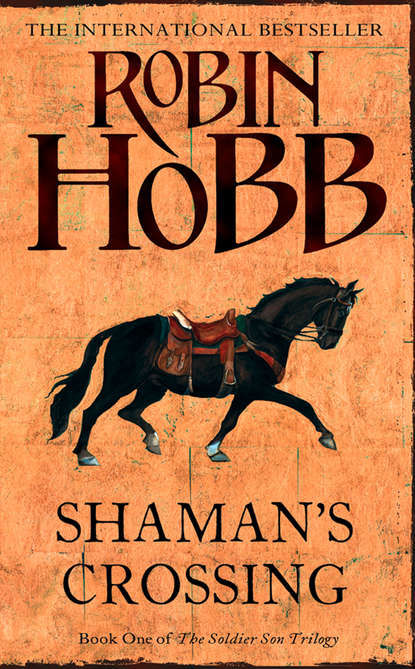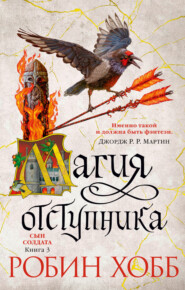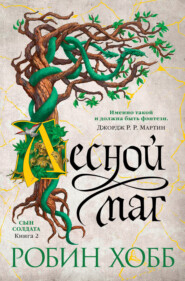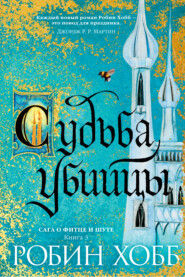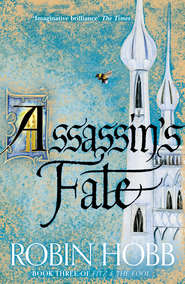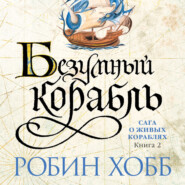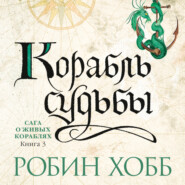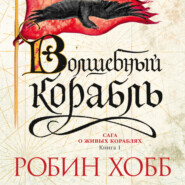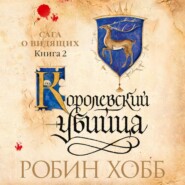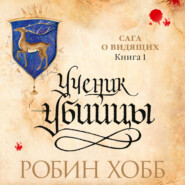По всем вопросам обращайтесь на: info@litportal.ru
(©) 2003-2024.
✖
Shaman’s Crossing
Автор
Год написания книги
2019
Настройки чтения
Размер шрифта
Высота строк
Поля
That morning, he offered me meat without my asking, and showed me how he used the water plants as a filter when he filled his long tubular waterskins. I think they were made of gut. He also caught several of the gore frogs, taking great care not to touch them with his bare hands. He carried them away from the sike to a large flat rock and marooned them there. The little red creatures swiftly baked flat and brown in the hot sun of the day. He made a packet from the tough, flat leaves of a swort bush and carefully stored the dried frogs in one of the inner pockets of his loose robe. I was beginning to realize that although I had believed we had both ridden away from his camp empty-handed, Dewara had actually been very well supplied for our sojourn. He had with him all we both needed to survive. To get it from him, he would force me to admit my dependency on him.
He was so cheerful and affable with me, it was bewildering for me to sustain my wariness, but I managed. He suddenly stepped into the role of instructor, as if he had finally decided he would teach me the things my father had wanted me to learn. When we mounted up that first morning by the pond, I thought we would go straight back to his camp on my father’s lands near the river. Instead, he led and I followed. We stopped at mid-day, and he gave me a small sling, showed me the Kidona style of using it and told me to practise with it. Then we left our taldi and moved into scrub brush along the edge of a ravine. He stunned the first prairie grouse we flushed and I raced up to wring its neck before it recovered. His second one, he broke the wing, and the bird led me a merry chase before I caught it. I could not hit a bird for the life of me until the late afternoon, when I actually killed one with my stone.
That night we had fire and cooked meat and shared his waterskin as if we were companions. I said little to him, but he had become suddenly garrulous. He told me a number of battle tales from his day as a warrior, back in the time when the Kidona raided their fellow plainsmen. They were full of blood and rape and pillaging, and he laughed aloud as he joyously recalled those ‘victories’. From those tales, he went on to ‘sky legends’ about the constellations. Most of his hero tales seemed to involve deceit, theft or wife stealing. I perceived that a successful thief was admired among the Kidona, while a clumsy one often paid with his life. It seemed an odd morality to me. I fell asleep as he told a story about seven lovely sisters and the trickster who seduced them in succession and had a child with each one of them while marrying none of them.
His people had no writing, yet they kept their history in their oral accounts. I was to hear many of them in the long nights that followed. Sometimes when he told tales, I could hear the echo of the years of repetition in the measured way he spoke. The oldest tales of his people spoke of when they were a settled folk and lived in the skirts of the mountains. The Dappled People had driven them out from their homes and farms, and a curse from the Dapples had made his people wanderers, doomed to live by raids and thefts and blood instead of tending plants and orchards. The way he spoke of the Dapples as immensely powerful sorcerers who lived in ease among their vast riches confused me for several days. Who were these people with patterned skins and magic that could cause a wind of death to blow upon their enemies? When I finally realized that he was speaking of the Specks, it was almost like seeing double of a familiar image. The image and opinion I had of the Specks as a primitive woodland tribe of simple-minded people was suddenly overlaid with Dewara’s image of them as a complex and formidable foe. I mentally resolved it by deciding that the Specks had, somehow, forced the Kidona to retreat from their settled lands and become wanderers and scavengers. Therefore Dewara’s people had endowed them with tremendous and legendary power to excuse their failure to prevail against the Specks. This ‘solution’ troubled me, for I knew it didn’t quite fit. It was like rough boards nailed over a broken window. The cold winds of another truth still blew through it and chilled me even then.
I never felt any warm glow of friendship or true trust of Dewara, but in the days that followed, he taught and I learned. From Dewara, I learned to ride as the Kidona did, to mount one of his taldi by running alongside it, to cling to the mare’s bare smooth back and guide her by tiny thuds of my heels, to slide off my mount, even at a gallop, into a tumbling roll, from which I could either fling myself flat or come easily to my feet. My Jindobe, the trade language of all the plainspeople, became more fluent.
I had never been a fleshy youth, always rangy and, thanks to my father and Sergeant Duril, well muscled. But in the days that I was in Dewara’s care, I became ropy and tough as jerky. We ate only meat or blood. At first, I knew a terrible hunger, and dreamed of bread and sweets and even turnips, but those hungers passed like ill-advised lusts. A sort of euphoria at my reduced need for food replaced them. It was a heady sensation, difficult to describe. After my fifth or sixth day with Dewara, I lost count of the days, and moved into a time where I belonged to him. It was ever after difficult for me to describe the state of mind and body that I entered into, even to the trusted few with whom I discussed my sojourn with the Kidona warrior.
Almost every day we hunted pheasant and hare with slings, and drank blood drawn from our mounts when our hunt failed to produce a meal for us. He shared his water and dried meat with me, but sparingly. We often made camp without water or fire, and I stopped regarding such lacks as a hardship. He told stories every night and I began to have a sense of what passed for wrong and right amongst his people. To get another man’s wife with child, so that another warrior laboured to feed your get, was a riotously good jest upon that fellow. To steal and not be caught was the mark of a clever man. Thieves who were caught were fools and deserved no man’s mercy or sympathy. If a man had taldi, a wife and children, then he was wealthy and beloved of the gods, and the others of his tribe should pay heed to his counsel. If a man was poor, or if his taldi or wife or children sickened or died, then he was either stupid or cursed by the gods, and in either case, it was a waste of time to hark to him.
Dewara’s world was harsh and unforgiving, bereft of all the gentler virtues. I could never accept his people’s ways, yet in some curious fashion, I became more capable of seeing the world as he saw it. By the harsh logic of the Kidona, my people had defeated his and forced them to settle. They resented and hated us for it, and yet by their traditions, we could only do those things because the gods favoured us over them. Therefore, our wisdom was to be considered when we spoke. Dewara had been honoured when my father sent word that he wished him to be my instructor. That during the course of teaching me he could bully and mistreat me was a great honour to him, one that all his fellow Kidona would envy. Dewara had the son of his enemy at his mercy, and he would have no mercy for me. Freely he rejoiced before me, that I would carry a notch in my ear from his swanneck to the end of my days.
He teased me often, telling me that I was not bad, for a Gernian cub, but no Gernian cub would ever grow to be as strong as a Kidona plateau bear. Every day he taunted me with that, not cruelly, but as an uncle might, several times, holding his full acceptance of me always just out of my reach. I thought I had won his regard when he began to teach me how to fight with his swanneck. He grudgingly conceded that I attained some skill with it, but would always add that that evil metal had ruined my ‘iron-touched’ hands, and thus I could never regain the purity of a true warrior.
I challenged him on that. ‘But I heard you asking my father to trade guns for what you are teaching me. Guns are made of iron.’
He shrugged. ‘Your father ruined me when he shot me with an iron ball. Then he bound my wrists with iron, so that all my magic was still inside me. It has never fully come back. I think a little bit of his iron stayed in me.’ And here he slapped his shoulder, where I knew he still bore the scar of my father’s shot. ‘He was smart, your father. He took my magic from me. So, of course, I try to trick him. If I could, I would take his kind of magic from him, and turn it against his people. He said “no”, this time. He thinks he can keep it from me always. But there are other men who trade. We will see how it ends.’ Then he nodded to himself in a way I didn’t like. In that moment, I was completely my father’s son, the son of a cavalla officer of King Troven, and I resolved that when I returned, I would warn my father that Dewara still meant him harm.
The longer I stayed with him, living by his rules, the more I felt that I straddled two worlds, and that it would not take much to step fully into his. I had heard of that happening to troopers or those who interacted too freely with the plainspeople. Our scouts routinely camouflaged themselves in the language, dress and the customs of the indigenous people. Travelling merchants who traded with the plainspeople, exchanging tools and salt and sugar for furs and handicrafts, spanned the boundaries of the cultures. It was not uncommon to hear of Gernians who had gone too far and crossed over into plainspeople ways. Sometimes they took wives from amongst them, and adopted their way of dress. Such men were said to have ‘gone native’. It was recognized that they were useful as go-betweens, but they were accorded little respect, less trust and almost no acceptance into gatherings of polite company, and their half-breed children could never venture into society at all. I wondered what had become of Scout Halloran and his half-breed daughter.
I could never conceive what would prompt any man to go native, but now I began to understand. Living alongside Dewara, I sometimes felt the urge to do something that would impress him, according to his own standards. I even considered stealing something from him, in some clever way that would force him to admit I was not dull-witted. Theft ran against all the morality I had ever been taught, and yet I found myself thinking about it often, as a way to win Dewara’s respect. Sometimes I would snap out of such pondering with a jolt, surprised at myself. Then I began to wonder whether stealing something from Dewara would truly be an evil act, when he seemed to regard it as a sort of contest of wits. He made me want to cross that line. In Dewara’s world, only a Kidona warrior was a whole man. Only a Kidona warrior was tough, of body and mind, and brave past any instinct for self-preservation. Yet self-preservation was high on a warrior’s priority list, and no lie, theft, or cruelty was inexcusable if it was done with the goal of preserving one’s own life.
Then one night he offered me the opportunity to cross over completely to his world.
Each day of our hunting and wandering had carried us closer to my father’s lands. I more felt this than knew it. One night we camped on an outcropping of rocky plateau that fell away in gouged cliffs. The altitude gave us a wide view of the plains below us. In the distance, I saw the Tefa River carving its way through Widevale. I made our fire Kidona-style, as Dewara had taught me, with a strip of sinew and a curved stick as my fire-bow. I was much quicker at it than I had been. The narrow-leaved bushes that edged our campsite were resinous, but even though the branches were green they burned well. The fire crackled and popped and gave off a sweet smoke. Dewara leaned close to breathe in the fumes and then sat back, sighing them out in pleasure. ‘That is how the hunting grounds of Reshamel smells,’ he told me.
I recognized the name of a minor deity in the Kidona pantheon. So I was a bit surprised when Dewara went on, ‘He was the founder of my house. Did I tell you that? His first wife had only daughters, so he put her aside. His second wife bore only sons. The daughters of his line wed the sons of his line, and thus I have the god’s blood in me twice.’ He thumped his chest proudly and waited for me to respond. He’d taught me this game of bragging, where each of us tried to top the other’s previous claim. I could think of no reply to his claim of divine descent.
He leaned closer to the fire, breathed the sweet smoke and then said, ‘I know. Your “good god” lives far away, up past the stars. You are not the descendants of his loins but of his spirit. Too bad for you. You have no god’s blood in your veins. But,’ he leaned closer to me, and pinched me hard on the forearm, a physical gesture I’d become accustomed to. ‘But I could show you how to become part god. You are as much Kidona as I can make you, Gernian. It would be up to Reshamel to judge you and see if he wished to take you to be one of us. It would be a hard test. You might fail. Then you would die, and not just in this world. But if you passed the test, you would win glory. Glory. In all worlds.’ He spoke of it as another man might gloat over gold.
‘How?’ The word popped out of me, a query that he took as assent.
He looked at me a long time. His grey eyes, unreadable even in the day, were a mystery in the twilight. Then he nodded, more to himself than to me, I think.
‘Come. Follow me where I will lead you.’
I stood to obey him, but he did not seem in a hurry to go anywhere. Instead, he bid me gather more leafy branches and build the fire up until it burned like a beacon. Sparks rose on its smoke whenever I threw more fuel on, and the heat of it made the sweat run down my face and back while the resinous aroma wrapped me. Dewara sat and watched me while I worked. Then, when the fire was roaring like a beast, he slowly stood. Walking to a nearby bush, he tore a fresh branch free, and then wrapped the leafy ends of it in several smaller branches. He wove the smaller branches deftly in and out of the larger one until he had a stick with a dense wad of foliage on one end. When he thrust it into the fire, it kindled almost immediately. Bearing this torch, he led me to the edge of our rocky campsite. For a very brief time he paused at the drop-off, staring out over the plain. In the distance, the land slowly swallowed the sun. Then, as full inky blackness poured over the low lands before us, he turned to me. The torch made his face a shifting mask of shadow and highlights. He spoke in a singsong voice, very different from his usual tone.
‘Are you a man? Are you a warrior? Would Reshamel welcome you to his hunting grounds, or feed your flesh to his dogs? Have you courage and pride, stronger than your desire to live? For that is what makes a Kidona warrior. A Kidona warrior would rather be brave and proud than alive. Would you be a warrior?’
He paused, awaiting my answer. I stepped into his world. ‘I would be a warrior.’ Around me, the wide plateaus and the prairie below seemed to catch their breath and wait.
‘Then follow me,’ he said. ‘I go to open a way for you.’ He lifted his free hand and seemed to touch his lips. For two breaths, he stood there, the flame-light etching his aquiline features into the night.
He stepped off the cliff’s edge.
In shock, I watched him fall, the flames of his torch streaming in the wind of his descent. Abruptly, he vanished. I saw the glow from the torch, but could not see the flame itself. Then even that faded to only a vague nimbus of light. Dewara was gone.
I stood alone on the cliff’s edge. Night was black around me. The wind pushed at me gently but insistently, bringing the sweet scent and heat of the roaring bonfire. It urged me toward the edge of the cliff. What I did I cannot explain, save by saying that Dewara had led me slowly into his world and his way of thinking and his beliefs. What would have been insane and unthinkable a month earlier now seemed my only possible path. Better to fall to my death than be seen as a coward. I stepped off the cliff’s edge.
I fell. I did not scream or even shout. I made that passage in silence, the wind ripping at my worn clothing as I fell. I cannot now judge how long or how far I fell. My feet struck something, and my knees buckled under the impact. I wind-milled my arms wildly, trying as much to fly as to catch my balance. In the darkness, a hand caught me by the front of my shirt and jerked me close. A voice I did not recognize as Dewara’s said, ‘You have passed the first gate. Open your mouth.’
I did.
He thrust something inside it, something small and flat and leathery hard. For a second, it tasted not at all, and then my saliva wet it, and a pungent taste filled my mouth. It was so strong that I smelled it as much as I tasted it. I felt it, too, a strange tingling that sent saliva cascading and made my nose run. An instant later, I heard the taste as well, as my ears began to ring. All my skin stood up in gooseflesh, and I felt the press of the night, not the air, but the darkness, touching my body. Darkness was not the absence of light, I suddenly knew. Darkness was an element that flowed in to fill spaces such as the one I now occupied. The hand that gripped my shirtfront pulled, and I stumbled forward. Somehow, I walked out of darkness and into another world. Light and the sweet scent of the burning torch overwhelmed my senses. I tasted light and heard the smell of the torch. I felt Dewara was there, but I could not see him. I could not see any distinct object. All distance around me faded to an equal blue. All of my senses were aware of every sensation.
A god spoke to me. ‘Open your mouth.’
Again, I obeyed.
Fingers reached between my lips and took a frog from my mouth. The man who smelled like Dewara set the frog on the flames of the torch that was suddenly a tiny campfire on a hearth of seven flat black stones. The frog burned and sizzled, and sent fine threads of fiery red smoke up along with the sweet smoke. The man pushed my head forward, so that I leaned over the tiny fire, breathing the fumes. The smoke stung my eyes. I closed them.
Again, I closed them.
But the landscape that had opened up around me the moment I shut my eyes did not disappear. I could not close my eyes to this world, for it existed inside me. We were on a steep hillside. Huge trees surrounded us, blocking the twilight that filtered down to us, and the forest floor was almost bare of plant life. It was carpeted instead with centuries of fallen leaves. A fine rain of dewdrops fell from the leaves above. A fat yellow snake slithered by, sparing us not a glance. The air was cool and full of moisture. The world smelled rich and alive.
‘This is an illusion,’ I said to Dewara. He stood beside me in that twilight world. I knew it was he, even though he was several feet taller than I was and wore a hawk’s head on his shoulders.
‘Gernian!’ He spat the word at me. ‘You are the one who is not real here. Do not profane the hunting grounds of Reshamel with your disbelief. Go.’
‘No,’ I begged him. ‘No. Let me stay. Let me be real here.’
He just looked at me. His hawk’s eyes were gold and round. His beak looked very sharp. His fingernails were black and curved like talons. I knew he could reach into my breast and lift out my beating heart if he chose to do so. Instead, he waited, giving me time to think.
Suddenly the right words came to me. ‘I would be a man. I would be a warrior. I would be Kidona.’
In some distant place, I was ashamed of myself for disowning my heritage and becoming a savage. Then like a bubble popping, that life no longer mattered. I was Kidona.
We journeyed in that place. I do not remember what time passed, and yet I do. I cannot, for the most part, summon up what we saw or did or spoke there. It is like trying to recall a dream after one has fully awakened. Yet to this day there are moments when I smell a resinous fragrance or hear a distant roar of rapids, and it will bring a sudden vivid recall of a moment in that place and time. I recall that Dewara wore a hawk’s head, and that I sometimes rode on a horse with two heads, one the bristle-maned head of a Kidona pony and one very like to my own Sirlofty. The memories come, sharp as broken glass and then ripple away like a disturbance in a pond. Sometimes I wake from ordinary sleep, grieving that I cannot recall the dreams of that place.
Only one incident remains clear in my mind from that experience. There was a time, neither evening nor morning, yet twilight all the same, as if twilight were the only time that place knew. Dewara and I stood on a bare bluff of deep blue stone. It was the place we had been journeying to, all that time. The forest on the steep hills behind us was a crouching guardian that watched over us. Before us was a chasm, sculpted more by wind than water. Within it, like strange towers of churches built to a wild god, tall pinnacles of stone rose from the distant floor of the canyon. The blustering air had carved spiralling towers and bulging knobs from the rock as neatly as a good cabinet-maker might turn a spindled leg for a chair. The freestanding spires of deeply swirled blue stood like a stony forest in the chasm before us. In the distance, I saw the sag and swoop of the wandering bridges that led from the stony cap of one hoodoo to the next, a meandering pathway across the divide. Dewara pointed across the rift that blocked us, to a land where slices of yellow light revealed stripes of ancient forest and rippling meadowland. The light moved across the land in the same way that cloud shadows dapple over a hill when the wind blows them.
‘There,’ he said, speaking loudly above the whispering sweep of a fragrant wind. He pointed with a long hand, and there were tufts of feathers at his wrist. ‘Over there, you behold the dream home of my people. To get there, one must make a leap, and then cross the six spirit bridges of the Kidona tribe. All it once meant to be a Kidona lived in those bridges. They were built from the stuff of our souls. To cross them was to affirm to our gods that we were Kidona.
‘It was never an easy crossing; always it required courage, but we are a courageous people. And we knew that beyond the challenge of the shaman’s crossing was our homeland, the birthplace of our souls, our place of dreaming, the place to which our spirits ultimately return. But now it has been generations since any Kidona could complete the journey. The bridge was stolen from us. The Dappled Ones robbed us, and made the passage their own. They will suffer none of us to pass.
‘Once, it was our custom that every young warrior and maiden should make this journey. From here, each would cross to the dream place, and sojourn there until a beast of that world chose him. Ever after, that beast would be the guardian of his spirit, offering him wisdom and advice. Our warriors were mighty, and our fields were fertile. In that time, the gentle hills were ours, and we lived well. Our cattle increased every year until they covered the foothills like stones beside a watercourse. We raided far, but for honour and treasures rather than sustenance, for we had a home that yielded all we needed. The Kidona were a mighty people, content with our blessings and a glory to our gods. All that, all that, was taken from us by the Dappled Ones and we were doomed to become nomads, herders of the dust storms, planting only bodies and reaping only death.’
He dropped his hand to his side. He bowed his bird’s head, expressing a sorrow beyond words and stared with longing across the divide.
‘What befell your people?’ I asked at last, when it was plain he intended to say no more.
He heaved a great sigh. ‘In those days, we lived far to the east, in the foothills of what Gernians call the Barrier Mountains. A foolish name. They are not a barrier, but a bridge. The mountains are full of game and rich with trees bearing flowers, fruit and running with sweet sap. Their thick forests are shady and cool in the heat of summer. When the storms of winter blow, the tree canopies are shelter from deep snow and the sweep of the wind. The forests gave us everything we needed. The streams that run down from the high snows teem with fish, frogs, and turtles. Once, they were ours, our land to hunt and forage, and we were a wealthy people. In the forests, we hunted and harvested the same lands as the Dappled Folk. But we also ventured out onto the plains, standing out in the full sun, as they did not dare to do, for their eyes and skin cannot tolerate the full brightness of day. They are creatures of the shadows and twilight times. On the plains at the foot of the mountains, the Kidona kept our herds and flocks in the summer. There we built our towns and cities, our monuments and roads. In the winters, our herdsmen took our beasts up into the shelter of the forest. We prospered. Our herds increased. Our women were thriving, our men full of vigour and so many children were born to us that yearly we had to build new rearing temples to house them.
‘All would have been well, save for the Dappled Folk who infested the mountain forests above us. They resented the increase of our herds, and strove to prevent our expansion of our grazing lands and our taking of timber for our towns. They said that our sheep and our kine ate too much, and that our taldi trampled the winding forest paths into wide roads. They complained of the land that we cleared for fields and mourned every tree that fell to our axes. They claimed the forest as their own, and wanted it to remain as if no man had ever trod there. We wished only to be allowed to have our children, to hunt and harvest as our fathers and grandfathers had done before us. We argued with the Dappled Folk. And eventually, we fought with them.





